A Man with a Lamp

Once upon a time, there was a small town. There lived a man by himself who couldn’t see. He was blind. Yet, he carried a lighted lamp with him whenever he went out at night.
One night as he was coming home after having a dinner outside, he came across a group of young travellers. They saw that he was blind, yet carrying a lighted lamp. They started passing comments on him and made a fun of him. One of them asked him, “Hey Man! You are blind and can’t see anything! Why do you carry the lamp then?!”
The blind man replied, “Yes, unfortunately, I am blind and I can’t see anything but a lighted lamp which I am carrying is for the people like you who can see. You may not see the blind man coming and end up pushing me. That is why I carry a lighted lamp”.
The group of travellers felt ashamed and apologized for their behaviour.
Moral: We should think before judging others. Always be polite and learn to see things from others point of view.
Sometimes Just let it be
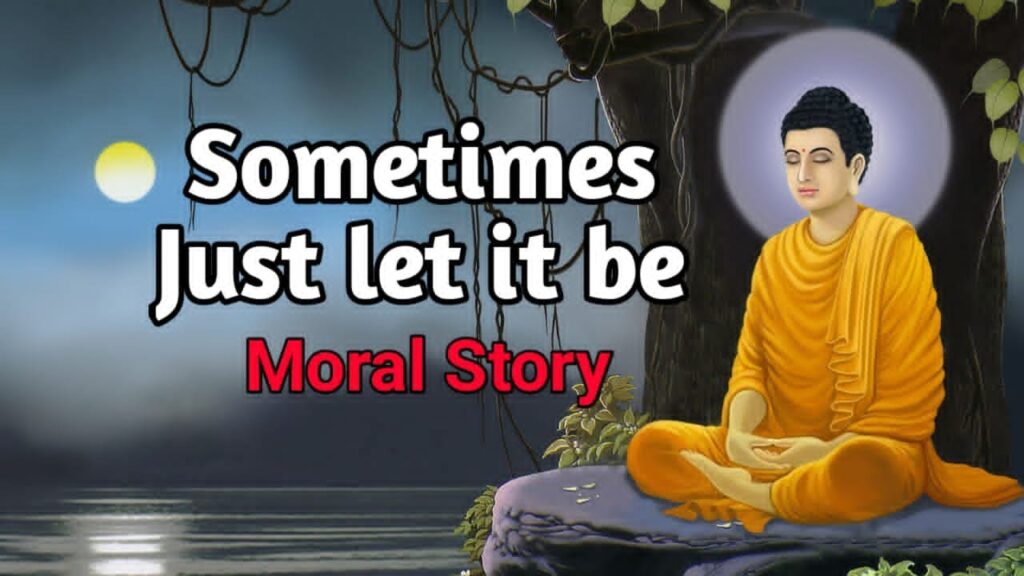
Once Buddha was walking from one town to another town with a few of his followers. This was in the initial days. While they were traveling, they happened to pass a lake. They stopped there and Buddha told one of his disciples, “I am thirsty. Please get me some water from that lake there”.
The disciple walked up to the lake. When he reached it, he noticed that some people were washing clothes in the water and, right at that moment, a bullock cart started crossing the lake right at the edge of it. As a result, the water became very muddy, very turbid. The disciple thought, “How can I give this muddy water to Buddha to drink?!” So he came back and told the Buddha, “The water in there is very muddy. I don’t think it is fit to drink”.
So, the Buddha said, let us take a little rest here by the tree. After about half an hour, again Buddha asked the same disciple to go back to the lake and get him some water to drink. The disciple obediently went back to the lake. This time he found that the lake had absolutely clear water in it. The mud had settled down and the water above it looked fit to be had. So he collected some water in a pot and brought it to the Buddha.
The Buddha looked at the water, and then he looked up at the disciple and said, “See, You let the water be and the mud settled down on its own. You got a clear water. It didn’t require any effort”.
Moral: Your mind is also like that. When it is disturbed, just let it be. Give it a little time. It will settle down on its own. You don’t have to put in any effort to calm it down. We can judge and take best decisions of our life when we stay calm.
The Needy King and a Sage
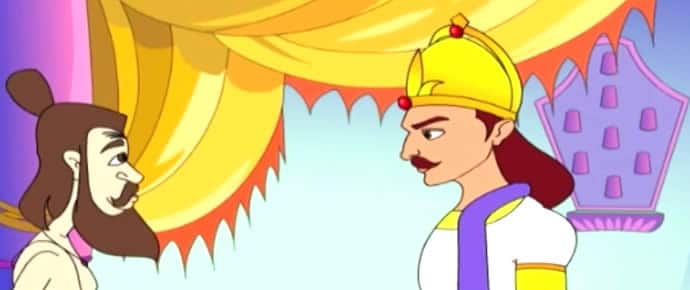
A Sage was passing through the capital city of the famous king. While he was walking, he noticed a single currency coin on the road. He picked it up. He was satisfied with his simple living and he had no use of that coin. So, he planned to donate it to the one who is in need of it. He strolled around the streets throughout the day but didn’t find anyone such. Finally, he reached the rest area and spent a night there.
Next morning, he wakes up in the morning for his daily activities and sees that a king is going for his invasion of another state with his war ready army. When the king saw the sage standing, he ordered his army to be stopped. He came to the Sage and said, “Oh Great Sage, I am going to war to win another state so that my state can be expanded. So bless me to be victorious”.
After thinking, Sage gave a single currency coin to the king! The king was confused and annoyed with this because what use he has for a single coin while he is already one of the richest kings! He curiously asked a sage, “what’s the meaning of this one coin?”
A Sage explained, “Oh Great King! I found this coin yesterday while strolling around the streets of your capital city. But I had no use of it. So, I had decided that I will donate it to someone needy. I strolled around till the evening in your capital, but found no one such. Everyone was living a happy life. It seemed that they were satisfied with what they had. So I found no one to give this coin. But today, the king of this state, still have the desire to gain more and not satisfied with what he already has, I felt you were in need of this coin.”
The King realized his mistake and gave up the planned war.
Moral: We all should learn to be happy with what we have. Yes, we all desire more or better than we already have, but do not waste a chance of enjoying what you already have. There are those who may not have what you have, and there will be some who have lots more than you have. Do not always compare, be happy and lead a healthy life.
Keeping the roots stronger

Once upon a time, there were two neighbors living next to each other. One of them was a retired teacher and another was an insurance agent who had a lot of interest in technology. Both of them had planted different plants in their garden. The retired teacher was giving a small amount of water to his plants and didn’t always give a full attention to them, while the other neighbor interested in technology, had given a lot of water to his plants and looked after them too well.
The retired teacher’s plants were simple but looked good. The insurance agent’s plants were much fuller and greener. One day, during the night, there was a heavy rain and a wind due to a minor storm. Next morning, both of the neighbors came out to inspect the damage to their garden. The neighbor who was an insurance agent saw that his plants came off from the roots and were totally destroyed. But, the retired teacher’s plants were not damaged at all and were standing firm.
The insurance agent neighbor was surprised to see it, he went to the retired teacher and asked, “We both grew the same plants together, I actually looked after my plants better than you did for yours, and even gave them more water. Still, my plants came off from the roots, while yours didn’t. How is that possible?”
The retired teacher smiled and said, “You gave your plants more attention and water, but because of that they didn’t need to work themselves for it. You made it easy for them. While I gave them just an adequate amount of water and let their roots search for more. And, because of that, their roots went deeper and that made their position stronger. That is why my plants survived”.
Moral: This story is about parenting where children are like plants. If everything is given to them, they will not understand the hard work it takes to earn those things. They will not learn to work themselves and respect it. Sometimes it’s best to guide them instead of giving them. Teach them how to walk, but let them follow their path.
The Seven Wonders

Anna was a 9-year-old girl from the small village. She finished attending elementary school till 4th grade at her village. For the 5th grade onwards, she will have to get an admission in a school at a city nearby. She got very happy knowing that she was accepted in a very reputed school in a city. Today was the first day of her school and she was waiting for her school bus. Once the bus came, she got in it quickly. She was very excited.
Once the bus reached to her school, all students started going to their classes. Anna also made it to her classroom after asking fellow students for direction. Upon seeing her simple clothing and knowing she is from a small village, other students started making fun of her. The teacher soon arrived and she asked everyone to keep quiet. She introduced Anna to the class and told that she will be studying with them only from today.
Then the teacher told the students to be ready for the surprise test now! She told everyone to write down the 7 wonders of the world. Everyone started writing the answer quickly. Anna started to write the answer slowly.
When everyone except Anna had submitted their answer paper, the teacher came and asked Anna, “What happened Dear? Don’t worry, Just write what you know as other students have learned about it just a couple of days back”.
Anna replied, “I was thinking that there are so many things, which 7 I can pick to write!” And, then she handed her answer paper to the teacher. The teacher started reading everyone’s answers and the majority had answered them correctly such as The Great Wall of China, Colosseum, Stonehedge, Great Pyramid of Giza, Leaning Tower of Pisa, Tajmahal, Hanging Gardens of Babylon etc.
The teacher was happy as students had remembered what she had taught them. At last the teacher picked up Anna’s answer paper and started reading.
“The 7 Wonders are – To be able to See, To be able to Hear, To be able to Feel, To Laugh, To Think, To be Kind, To Love!”
The teacher stood stunned and the whole class was speechless. Today, a girl from the small village reminded them about the precious gifts that god has given us, which are truly a wonder.
Moral: Value what you have, use what you have, trust what you have. You don’t always have to look away to find an inspiration. God has given you all the strength to reach your goals.
The Circle of Good Deed
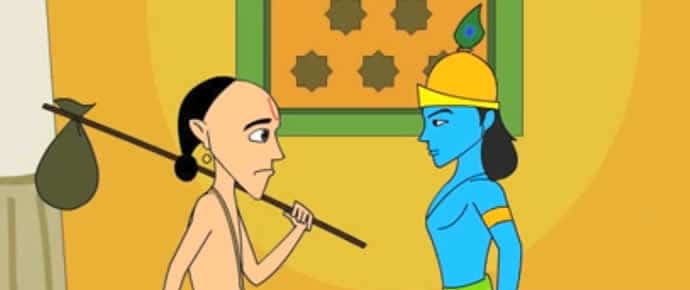
Once upon a time Shree Krishna and Arjun went for a short stroll around the city. They saw a poor looking priest begging. Arjun felt pity at him and he gave him a bag full of 100 gold coins. The priest became very happy and thanked Arjun. He left for his home. On way, he saw another person who needed help. The priest could have spared a coin or two to help that person. however, he chose to ignore it. But on way to his home, one thief robbed him of his bag of coins and ran away.
The priest became dejected and went back again for begging. Next day again when Arjun saw the same priest begging and he was surprised that after getting a bag full of coins which can last a lifetime, the priest was still begging! He called the priest and asked him the reason for this. The priest told him about the whole incident and Arjun again felt pity at him. So, this time he gave him a diamond.
The priest became very happy and left for home and he again saw someone who needed help but he chose to ignore again. Upon reaching home, he safely put the diamond in an empty pot of water with a plan to cash it out later and live a wealthy life. His wife was not at home. He was very tired so he decided to take a nap. In between, his wife came home and picked up that empty pot of water, walked towards the river close by to fill up the water. She had not noticed the diamond in the pot. Upon arriving at the river, she put the whole pot into the running river water to fill it up. She filled up the pot but the diamond was gone with the water flow!
When the priest woke up, he went to see the pot and asked his wife about the diamond. She told him, she had not noticed it and it must have been lost in the river. The priest couldn’t believe his bad luck and again started begging. Again Arjun and Shree Krishna saw him begging and Arjun inquired about it. Arjun felt bad and started thinking if this priest will ever have a happy life.
Shree Krishna who is an incarnation of God smiled. Shree Krishna gave that priest one coin which was not even enough for buying a lunch or dinner for one person. Arjun asked Shree Krishna, “Lord, I gave him gold coins and diamond, which could have given him a wealthy life, yet it didn’t help him. How will just one coin help this poor guy?” Shree Krishna smiled and told Arjun to follow that priest and find out.
On the way, the priest was thinking that one coin Shree Krishna gave him, he can’t even buy a lunch for one person. Why would he give so little? He saw a fisherman who was getting a fish out of his net. Fish was struggling. The priest felt pity at fish. He thought that this one coin won’t solve my problem, why not I save that fish. So the priest paid the fisherman and took the fish. He put the fish in his small pot of water which he always carried with him.
The fish was struggling in a small pot of water, ended up throwing out a diamond from the mouth! The priest screamed with a joy, “I got it, I got it”. At that same point, the thief who had robbed the priest’s bag of 100 gold coins, was passing through there. He thought that the priest recognized him and may get him punished. He got nervous and ran to the priest. He apologized to the priest and returned his bag full of 100 gold coins. The priest couldn’t believe what just happened.
Arjun saw all this and said, “Oh Lord, Now I understand your play”.
Moral: When you have enough to help others, don’t let that chance go. Your good deeds will always be repaid to you.
Act of Kindness and Goodwill

Mr. Phillips was just getting ready to leave his office and he remembered that his wife had asked him to bring 1KG of Bananas. When He stepped out, he saw an ill-looking old lady across the road. She was selling fresh bananas on the street. Mr. Phillips usually buys bananas from a grocery shop few blocks away from his office but since he was in hurry to reach home today, he thought about buying them from across the road only.
He went to the old lady and asked her the price. She quoted $7 per 1KG. He told, “But the store where I usually buy from gives them for $5 per 1KG, can you not give me for the same price?” The Old Lady told, “No Sir, I can not afford to match that price. I can sell them to you at $6 per 1KG. That’s best I can afford to give you for.” Mr. Phillips told her, “nevermind”. He left in his car towards the usual grocery shop.
He went inside and picked up a good bunch of bananas. He went to the cashier to pay for them but he was surprised when the cashier told him that price per 1KG is $10. He told the cashier, “I have been buying bananas from here only for some years and this is a steep price increase, can’t you offer me a better deal for being a loyal customer?” The Manager overheard him and came there. He told Mr. Phillips, “Sorry Sir but our prices are fixed, we do not bargain.” Mr. Phillips felt little bad with that flat attitude. He thought for a second and put those bananas back. He went back to the old lady. She recognized him instantly and told him, “Sir, I can’t match that price, I won’t be able to earn any profit.”
Mr. Phillips told her, “Don’t worry about the price, I will pay you $10 Per KG! Now, give me 2KG.” The Old Lady got very happy, she packed 2KGs of Bananas and said, “I can’t take $10 but I will take $7 per KG. I appreciate your kindness.” She also told him, “My Husband used to own a small fruit shop but he got very sick. We have no child or any relatives who could support us. We had to sell his shop to cover his medical bills but he could not survive.” Tears were flowing from her eyes. She said, “But now to support myself I am trying to sell what I can afford to buy and sell, so I can survive for what’s left of my life.”
Mr. Phillips told her, “Do not worry, You are doing good and from tomorrow on, I will only buy bananas from you.” He pulled out his wallet and gave her $100 extra and said, “Take this, Bring more different fruits to sell tomorrow, consider this an advance payment for fruits I will be buying from you. You can earn more if you have more choices of fruits to sell.” The Old Lady thanked him.
Later, He recommended many of his colleagues to buy fruits from the lady which they did. And with the support from Mr. Phillips and many other buyers, she made a better living.
Moral: Often we choose to go in big malls or big grocery shops for a shopping. We always pay the fixed price without bargaining. That is fine as we all have choices and people who run their business have their liabilities too. However, we need to spare a moment and think that why we have no courage or reason to bargain while shopping at big shops and why we try to bargain heavily with small street vendors? Think wisely. Always be helpful and supportive to someone who works hard to earn and has a need for it. Think, what Mr. Phillips had thought for a second and why he decided to buy from the old lady..
Hundred Gold Coins & Birbal
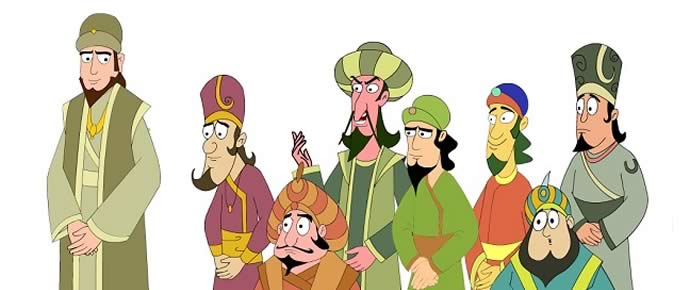
The wisdom of Birbal was unparalleled during the reign of Emperor Akbar. But Akbar’s brother in law was extremely jealous of him. He asked the Emperor to dispense with Birbal’s services and appoint him in his place. He gave ample assurance that he would prove to be more efficient and capable than Birbal. Before Akbar could take a decision on this matter, this news reached Birbal.
Birbal resigned and left. Akbar’s brother in law was made the minister in place of Birbal. Akbar decided to test the new minister. He gave three hundred gold coins to him and said, “Spend these gold coins such that, I get a hundred gold coins here in this life; a hundred gold coins in the other world and another hundred gold coins neither here nor there.”
The minister found the entire situation to be a maze of confusion and hopelessness. He spent sleepless nights worrying how he would get himself out of this mess. Thinking in circles was making him go crazy. Eventually, on the advice of his wife, he sought Birbals help. Birbal said, “Just give me the gold coins. I shall handle the rest.”
Birbal walked the streets of the city holding the bag of gold coins in his hand. He noticed a rich merchant celebrating his son’s wedding. Birbal gave a hundred gold coins to him and bowed courteously saying, “Emperor Akbar sends you his good wishes and blessings for the wedding of your son. Please accept the gift he has sent.” The merchant felt honored that the king had sent a special messenger with such a precious gift. He honored Birbal and gave him a large number of expensive gifts and a bag of gold coins as a return gift for the king.
Next, Birbal went to the area of the city where the poor people lived. There he bought food and clothing in exchange for a hundred gold coins and distributed them in the name of the Emperor.
When he came back to town he organized a concert of music and dance. He spent a hundred gold coins on it.
The next day Birbal entered Akbar’s darbar and announced that he had done all that the king had asked his brother-in-law to do. The Emperor wanted to know how he had done it. Birbal repeated the sequences of all the events and then said, “The money I gave to the merchant for the wedding of his son – you have got back while on this earth. The money I spent on buying food and clothing for the poor – you will get it in the other world. The money I spent on the musical concert – you will get neither here nor there.” Akbar’s brother in law understood his mistake and resigned. Birbal got his place back.
Moral: The money you spend on friends is returned or reciprocated in some form or the other. The money spent on charity gets converted into blessings from God which will be your eternal property. The money spent on pleasures is just frittered away. So when you spend your money, think a little, if not a lot.
Little Boy’s Meeting with God

There once was a little boy who wanted to meet God. He knew it was a long trip to where God lived, so he packed his suitcase with Twinkies and a six-pack of root beer and started his journey. When he had gone about three blocks, he met an old woman. She was sitting in the park just staring at some pigeons.
The boy sat down next to her and opened his suitcase. He was about to take a drink from his root beer when he noticed that the old lady looked hungry, so he offered her a Twinkie. She gratefully accepted it and smiled at him. Her smile was so pretty that the boy wanted to see it again, so he offered her a root beer. Once again she smiled at him. The boy was delighted! They sat there all afternoon eating and smiling, but they never said a word.
As it grew dark, the boy realized how tired he was, and he got up to leave but before he had gone more than a few steps, he turned around, ran back to the old woman and gave her a hug. She gave him her biggest smile ever. When the boy opened the door to his own house a short time later, his mother was surprised by the look of joy on his face. She asked him, “What did you do today that made you so happy?” He replied, “I had lunch with God.” But, before his mother could respond, he added, “You know what? She’s got the most beautiful smile I’ve ever seen!”
Meanwhile, the old woman, also radiant with joy, returned to her home. Her son was stunned by the look of peace on her face and he asked, “Mother, what did you do today that made you so happy?” She replied, “I ate Twinkies in the park with God.” But, before her son responded, she added, “You know, he’s much younger than I expected.”
Moral: God is everywhere. We just need to share our happiness and make others smile to feel him.
Learn to Appreciate
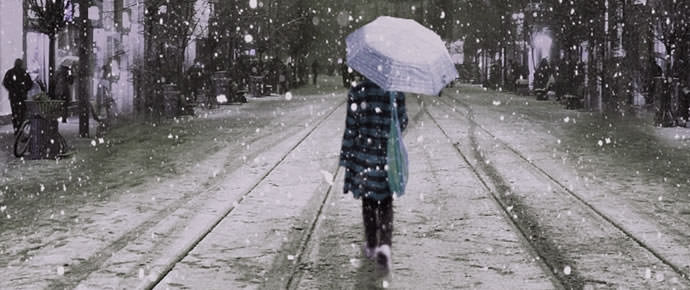
Once upon a time, there was a man who was very helpful, kindhearted, and generous. He was a man who will help someone without asking anything to pay him back. He will help someone because he wants to and he loves to. One day while walking into a dusty road, this man saw a purse, so he picked it up and noticed that the purse was empty. Suddenly a woman with a policeman shows up and gets him arrested.
The woman kept on asking where did he hide her money but the man replied, “It was empty when I found it, Mam.” The woman yelled at him, “Please give it back, It’s for my son’s school fees.” The man noticed that the woman really felt sad, so he handed her all his money. He could see that the woman was a single mother. The man said, “Take these, sorry for the inconvenience.” The woman left and a policeman held the man for further questioning.
The woman was very happy but when she counted her money, later on, it was doubled, she was shocked. One day while the woman was going to pay her son’s school fees towards the school, she noticed that some skinny man was walking behind her. She thought that he may rob her, so she approached a policeman standing nearby. He was the same policeman, who she took along to inquire about her purse. The woman told him about the man following her, but suddenly they saw that man collapsing. They ran at him and saw that he was the same man whom they arrested a few days back for stealing a purse.
He looked very weak and the woman was confused. The policeman said to the woman, “He didn’t return your money, he gave you his money that day. He wasn’t the thief but hearing about your son’s school fees, he felt sad and gave you his money.” Later, they helped the man stand up, and the man told the woman, “Please go ahead and pay your son’s school fees, I saw you and followed you to be sure that no one steals your son’s school fees.” The woman was speechless.
Moral: Life gives you strange experiences, sometime it shocks you and sometimes it may surprise you. We end up making wrong judgments or mistakes in our anger, desperation and frustration. However, when you get a second chance, correct your mistakes and return the favor. Be Kind and Generous. Learn to Appreciate what you are given.
Smartest Man in the World
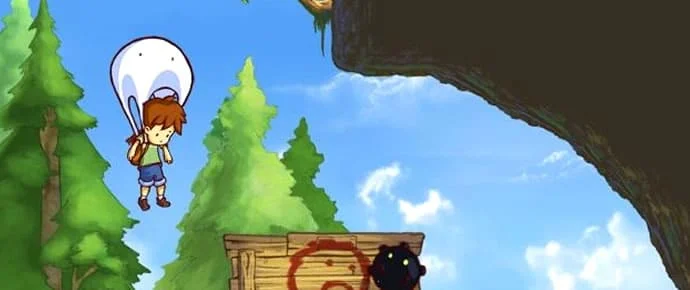
A doctor, a lawyer, a little boy and a priest were out for a Sunday afternoon flight on a small private plane. Suddenly, the plane developed engine trouble. In spite of the best efforts of the pilot, the plane started to go down. Finally, the pilot grabbed a parachute and yelled to the passengers that they better jump, and he himself bailed out.
Unfortunately, there were only three parachutes remaining.
The doctor grabbed one and said “I’m a doctor, I save lives, so I must live,” and jumped out.
The lawyer then said, “I’m a lawyer and lawyers are the smartest people in the world. I deserve to live.” He also grabbed a parachute and jumped.
The priest looked at the little boy and said, “My son, I’ve lived a long and full life. You are young and have your whole life ahead of you. Take the last parachute and live in peace.”
The little boy handed the parachute back to the priest and said, “Not to worry Father. The smartest man in the world just took off with my back pack.”
Moral: Your job doesn’t always define you, but being a Good Human being Does.
The White Elephant
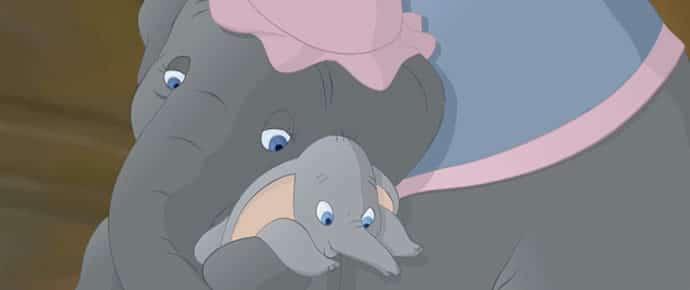
Once upon a time, there lived a herd of eighty thousand elephants at the bottom of the majestic Himalayas. Their leader was a magnificent and rare white elephant who was an extremely kind-hearten soul. He greatly loved his mother who had grown blind and feeble and could not look out for herself.
Each day this white elephant would go deep into the forest in search of food. He would look for the best of wild fruit to send to his mother. But alas, his mother never received any. This was because his messengers would always eat them up themselves. Each night, when he returned home he would be surprised to hear that his mother had been starving all day. He was absolutely disgusted with his herd.
Then one day, he decided to leave them all behind and disappeared in the middle of the night along with his dear mother. He took her to Mount Candorana to live in a cave beside a beautiful lake that was covered by gorgeous pink lotuses.
It so happened that one day, when the white elephant was feeding he heard loud cries. A forester from Benaras had lost his way in the forest and was absolutely terrified. He had come to the area to visit relatives and could not find his way out.
On seeing this big white elephant he was even more terrified and ran as fast as he could. The elephant followed him and told him not to be afraid, as all he wanted to do was to help him. He asked the forester why he was crying so bitterly. The forester replied that he was crying because he had been roaming the forest for the past seven days and could not find his way out.
The elephant told him not to worry as he knew every inch of this forest and could take him to safety. He then lifted him on to his back and carried him to the edge of the forest from where the forester went on his merry way back to Benaras.
On reaching the city, he heard that King Brahmadutta’s personal elephant had just died and the King was looking for a new elephant. His heralds were roaming the city, announcing that any man who had seen or heard of an elephant fit for a King should come forward with the information.
The forester was very excited and immediately went up to the King and told him about the white elephant that he had seen on Mount Candorana. He told him that he had marked the way and would require the help of the elephant trainers in order to catch this fantastic elephant.
The King was quite pleased with the information and immediately dispatched a number of soldiers and elephant trainers along with the forester. After travelling for many days, the group reached the lake besides which the elephants resided. They slowly moved down to the edge of the lake and hid behind the bushes. The white elephant was collecting lotus shoots for his mother’s meal and could sense the presence of humans. When he looked up, he spotted the forester and realized that it was he who had led the King’s men to him. He was very upset at the ingratitude but decided that if he put up a struggle many of the men would be killed. And he was just too kind to hurt anyone. So he decided to go along with them to Benaras and then request the benevolent King to be set free.
That night when the white elephant did not return home, his mother was very worried. She had heard all the commotion outside and had guessed that the King’s men had taken away her son. She was scared that the King would ride him in to battle and her son would definitely be killed. She was also worried that there would be no one to look after her or even feed her, as she could not see. She just lay down and cried bitterly.
Meanwhile her son was led in to the beautiful city of Benaras where he was given a grand reception. The whole city was decorated and his own stable was gaily painted and covered with garlands of fragrant flowers. The trainers laid out a feast for their new state elephant who refused to touch a morsel. He did not respond to any kind of stimuli, be it the fragrant flowers or the beautiful and comfortable stable. He just sat there looking completely despondent.
The worried trainers went straight to report the situation to their King, as they were scared that the elephant would just waste away without any food or water. The King was extremely concerned when he heard what they had to say and went to the stable himself. He offered the elephant food from the royal table and asked him why he grieved in this manner. He thought that the elephant should be proud and honored that he was chosen as the state elephant and would get the opportunity to serve his King.
But the white elephant replied that he would not eat a thing until he met his mother. So the King asked him where his mother was. The elephant replied that she was back home on Mount Candorana and must be worried and hungry as she was blind and had no one to feed her and take care of her. He was afraid that she would die.
The compassionate King was touched by the elephant’s story and asked him to return to his blind, old mother and take care of her as he had been doing all along. He set him free in love and kindness. The happy elephant went running home as fast as he could. And he was relieved to find that his mother was still alive. He filled his trunk with water and poured it over his sick mother who thought that it was raining. Then she cried out as she thought that some evil spirit had come to harm her and wished and prayed that her son was there to save her.
The white elephant gently bent over his blind mother and stroked her lovingly. She immediately recognized his touch and was overjoyed. Her son lifted her up and told her that the kind and compassionate King of Benaras had set him free and he was here to love and look after his mother forever.
His mother was absolutely thrilled and blessed the kind King with peace, prosperity and joy till the end of his days. She was so thankful to him for sending her son back home. The white elephant was able to take good care of his mother till the day she died. And when he died himself, the King erected a statue of him by the side of the lake and held an annual elephant festival there in memory of such a caring and noble soul.
Moral: Always give affection and care to our dear ones. Always respect other’s feelings.
The False Human Belief
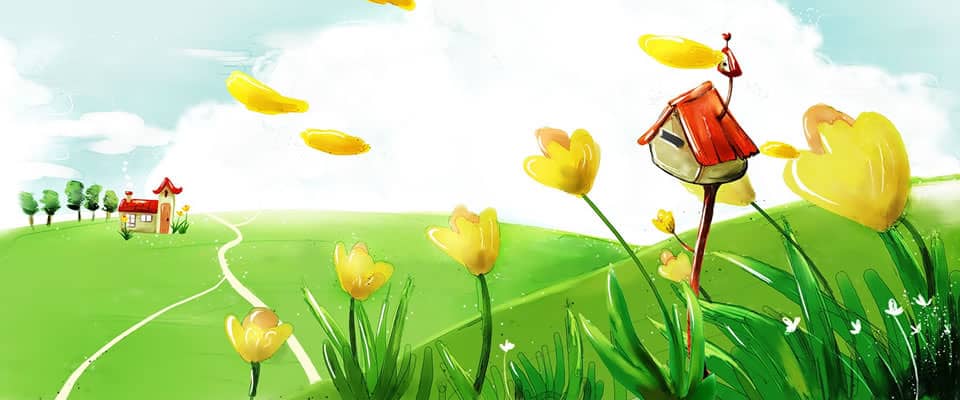
As a man was passing the elephants, he suddenly stopped, confused by the fact that these huge creatures were being held by only a small rope tied to their front leg. No chains, no cages. It was obvious that the elephants could, at any time can break away from their bonds but for some reason, they did not.
He saw a trainer nearby and asked why these animals just stood there and made no attempt to get away. “Well,” trainer said, “when they are very young and much smaller we use the same size rope to tie them and, at that age, it’s enough to hold them. As they grow up, they are conditioned to believe they cannot break away. They believe the rope can still hold them, so they never try to break free.”
The man was amazed. These animals could at any time break free from their bonds but because they believed they couldn’t, they were stuck right where they were.
Like the elephants, how many of us go through life hanging onto a belief that we cannot do something, simply because we failed at it once before?
Moral: Failure is a part of learning. We should never give up the struggle in life. You Fail not because you are destined to fail, but because there are lessons which you need to learn as you move on with your life.
The Praying Hands
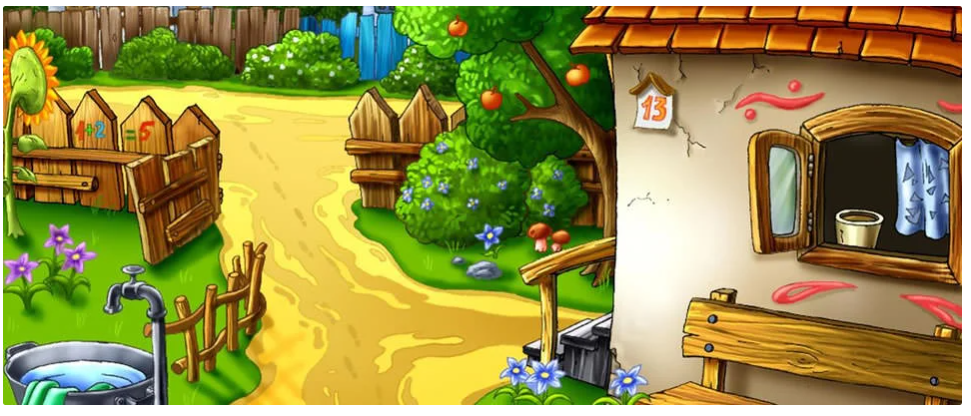
Back in the fifteenth century, in a tiny village near Nuremberg, lived a family with eighteen children. Eighteen! In order merely to keep food on the table for his big family, the father, a goldsmith by profession, worked almost eighteen hours a day at his shop and any other paying work he could find in the neighbourhood. Despite their seemingly hopeless condition, two of the eldest children had a dream. They both wanted to pursue their talent for art, but they knew well that their father would never be financially able to send either of them to Nuremberg to study at the Academy.
After many long discussions at night in their crowded bed, the two boys finally worked out a pact. They would toss a coin. The loser would go down into the nearby mines and with his earnings, support his brother while he attended the academy. The winner of the toss will attend the academy first and complete his study. Once, the first winner of the toss completes his study, he will help the other brother to attend the academy and support him financially by selling arts or working at the mines if necessary.
They tossed a coin on a Sunday morning after church. Albrecht Durer, one of the brother won the toss and went off to Nuremberg. Albert, the other brother went to work at the mines and for the next four years, financed his brother, whose work at the academy was almost an immediate sensation. Albrecht’s etchings, his woodcuts, and his oils were far better than most of his professors. By the time he graduated, he was beginning to earn considerable fees for his commissioned works.
When the young artist returned to his village, the Durer family held a festive dinner on their lawn to celebrate Albrecht’s triumphant homecoming. After a long and memorable meal, punctuated with music and laughter, Albrecht rose from his honoured position at the head of the table to drink a toast to his beloved brother for the years of sacrifice that had enabled Albrecht to fulfil his ambition. His closing words were, “And now, Albert, blessed brother of mine, now it is your turn. Now you can go to Nuremberg to pursue your dream and I will take care of you.”
All heads turned in eager expectation to the far end of the table where Albert sat, tears streaming down his pale face, shaking his lowered head from side to side while he sobbed.
Finally, Albert rose and wiped the tears from his cheeks. He glanced down the long table at the faces he loved, and then, holding his hands close to his right cheek, he said softly, “No, brother. I cannot go to Nuremberg. It is too late for me. Look what four years in the mines have done to my hands! The bones in every finger have been smashed at least once, and lately, I have been suffering from arthritis so badly in my right hand that I cannot even hold a glass to return your toast, much less make delicate lines on parchment or canvas with a pen or a brush. My brother, for me, it is too late.”
More than 450 years have passed. By now, Albrecht Durer’s hundreds of masterful portraits, pen and silver-point sketches, watercolours, charcoals, woodcuts, and copper engravings hang in every great museum in the world, but the odds are great that you, like most people, are familiar with only one of Albrecht Durer’s works. More than merely being familiar with it, you very well may have a reproduction hanging in your home or office.
One day, to pay homage to Albert for all that he had sacrificed, Albrecht Durer painstakingly drew his brother’s abused hands with palms together and thin fingers stretched skyward. He called his powerful drawing simply “Hands,” but the entire world almost immediately opened their hearts to his great masterpiece and renamed his tribute of love “The Praying Hands.”
Moral: The next time you see a copy of that touching creation, take a second look. Remember the sacrifice others may have made for your success in life. Always, respect them and care for them as what they could have done for themselves, they did that for your happiness.
Keep Your Dream
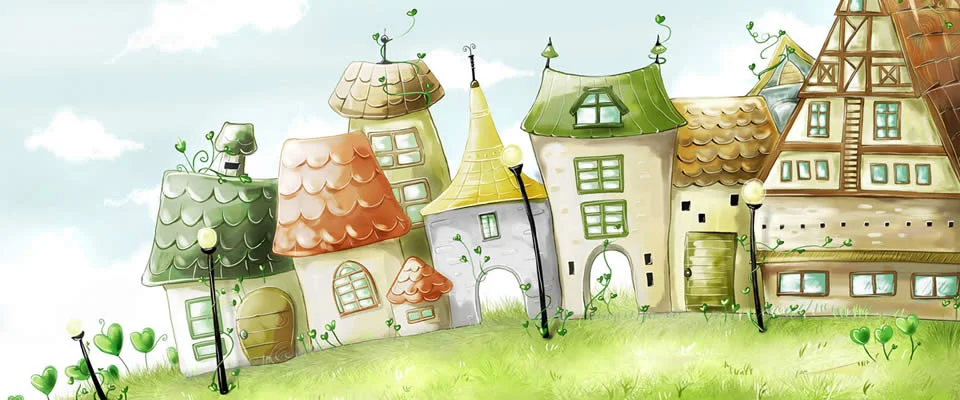
I have a friend named Monty Roberts who owns a horse ranch in San Isidro. He had let me use his horse ranch to put on fund-raising events to raise money for youth at risk programs.
The last time I was there he introduced me by saying, “I want to tell you why I let you use my horse ranch. It all goes back to a story about a young man who was the son of an itinerant horse trainer who would go from stable to stable, race track to race track, farm to farm and ranch to ranch, training horses. As a result, the boy’s high school career was continually interrupted. When he was a senior, he was asked to write a paper about what he wanted to be and do when he grew up.”
“That night he wrote a seven-page paper describing his goal of someday owning a horse ranch. He wrote about his dream in great detail and he even drew a diagram of a 200-acre ranch, showing the location of all the buildings, the stables, and the track. Then he drew a detailed floor plan for a 4,000-square-foot house that would sit on a 200-acre dream ranch.”
He put a great deal of his heart into the project and the next day he handed it into his teacher. Two days later he received his paper back. On the front page was a large red F with a note that read, `See me after class.’
The boy with the dream went to see the teacher after class and asked, `Why did I receive an F?’
The teacher said, `This is an unrealistic dream for a young boy like you. You have no money. You come from an itinerant family. You have no resources. Owning a horse ranch requires a lot of money. You have to buy the land. You have to pay for the original breeding stock and later you’ll have to pay large stud fees. There’s no way you could ever do it.’ Then the teacher added, `If you will rewrite this paper with a more realistic goal, I will reconsider your grade.’
The boy went home and thought about it long and hard. He asked his father what he should do. His father said, `Look, son, you have to make up your own mind on this. However, I think it is a very important decision for you.’ Finally, after sitting with it for a week, the boy turned in the same paper, making no changes at all.
He stated, “You can keep the F and I’ll keep my dream.”
Monty then turned to the assembled group and said, “I tell you this story because you are sitting in my 4,000-square-foot house in the middle of my 200-acre horse ranch. I still have that school paper framed over the fireplace.” He added, “The best part of the story is that two summers ago that same schoolteacher brought 30 kids to camp out on my ranch for a week.” When the teacher was leaving, he said, “Look, Monty, I can tell you this now. When I was your teacher, I was something of a dream stealer. During those years I stole a lot of kids dreams. Fortunately, you had enough gumption not to give up on yours.”
Moral: Don’t let anyone steal your dreams. Follow your heart, no matter what. No Dream is too big or too small when one works hard to live it. One should always try making dreams come true no matter what.
Baby Camel and Mother
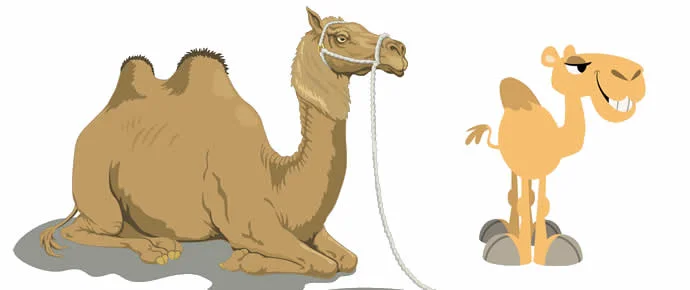
A mother and a baby camel were lying around, and suddenly the baby camel asked, “mother, may I ask you some questions? The mother said, “Sure! Why son, is there something bothering you? Baby said, “Why do camels have humps?” The mother said, “Well son, we are desert animals, we need the humps to store water and we are known to survive without water”.
Baby said, “Okay, then why are our legs long and our feet rounded?” The mother said, “Son, obviously they are meant for walking in the desert. You know with these legs I can move around the desert better than anyone does!” Baby said, “Okay, then why are our eyelashes long? Sometimes it bothers my sight”. Mother with pride said, “My son, those long thick eyelashes are your protective cover. They help to protect your eyes from the desert sand and wind”.
Baby after thinking said, “I see. So the hump is to store water when we are in the desert, the legs are for walking through the desert and these eyelashes protect my eyes from the desert than what in god’s name are we doing here in the Zoo!?”
Moral: Skills, knowledge, abilities and experiences are only useful if you are at the right place.
Boy’s Weakness
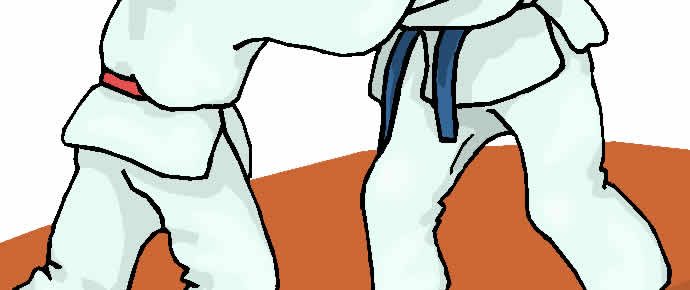
A 10-year-old boy decided to study judo despite the fact that he had lost his left arm in a devastating car accident.
The boy began lessons with an old Japanese judo master. The boy was doing well, so he couldn’t understand why, after three months of training the master had taught him only one move. “Sensei,”(Teacher in Japanese) the boy finally said, “Shouldn’t I be learning more moves?” “This is the only move you know, but this is the only move you’ll ever need to know,” the sensei replied.
Not quite understanding, but believing in his teacher, the boy kept training. Several months later, the sensei took the boy to his first tournament. Surprising himself, the boy easily won his first two matches. The third match proved to be more difficult, but after some time, his opponent became impatient and charged; the boy deftly used his one move to win the match. Still amazed by his success, the boy was now in the finals.
This time, his opponent was bigger, stronger, and more experienced. For a while, the boy appeared to be overmatched. Concerned that the boy might get hurt, the referee called a time-out. He was about to stop the match when the sensei intervened. “No,” the sensei insisted, “Let him continue.” Soon after the match resumed, his opponent made a critical mistake: he dropped his guard. Instantly, the boy used his move to pin him. The boy had won the match and the tournament.
He was the champion. On the way home, the boy and sensei reviewed every move in each and every match. Then the boy summoned the courage to ask what was really on his mind.
“Sensei, how did I win the tournament with only one move?”
“You won for two reasons,” the sensei answered. “First, you’ve almost mastered one of the most difficult throws in all of the judo. And second, the only known defense for that move is for your opponent to grab your left arm.”
The boy’s biggest weakness had become his biggest strength.
Moral: Sometimes we feel that we have certain weaknesses and we blame God, the circumstances or ourselves for it but we never know that our weaknesses can become our strengths one day. Each of us is special and important, so never think you have any weakness, never think of pride or pain, just live your life to its fullest and extract the best out of it!
Learning from Mistakes

Thomas Edison tried two thousand different materials in search of a filament for the light bulb. When none worked satisfactorily, his assistant complained, “All our work is in vain. We have learned nothing, Not sure if we can use an electricity properly.”
Edison replied very confidently, “Oh, we have come a long way and we have learned a lot. We know that there are two thousand elements which we cannot use to make a good light bulb.”
Moral: We can also learn from our mistakes.
The Lion and The Mouse
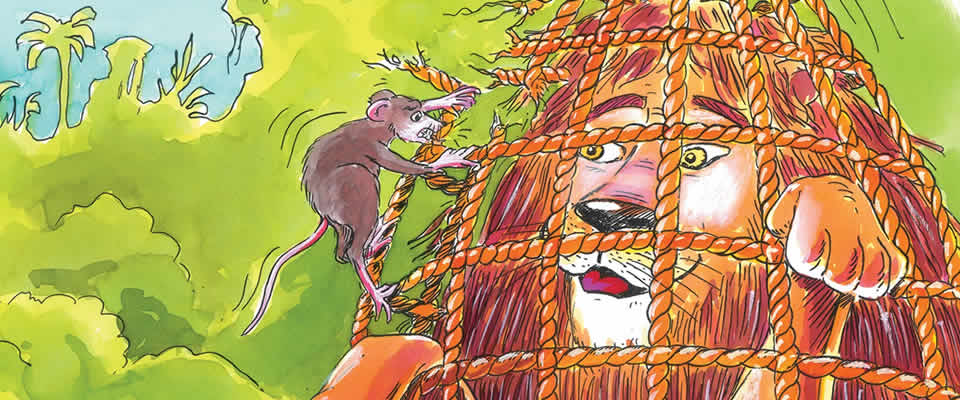
A Mouse running over his face awakened a Lion from sleep. Rising up angrily, he caught him and was about to kill him. Then the Mouse piteously entreated, saying:
“If you would only spare my life, I would be sure to repay your kindness.” The Lion laughed at him but allowed him to go. It happened shortly after this that some hunters, who bound him by strong ropes to the ground, caught the Lion. The Mouse, recognizing his roar, came and gnawed the rope with his teeth, and set him free, exclaiming:
“You ridiculed the idea of my ever being able to help you, never expecting to receive from me any repayment of your favor, Now you know that it is possible for even a Mouse to confer benefits on a Lion.”
Moral: It is possible for even a Mouse to confer benefits on a Lion.
The Dreaming Priest
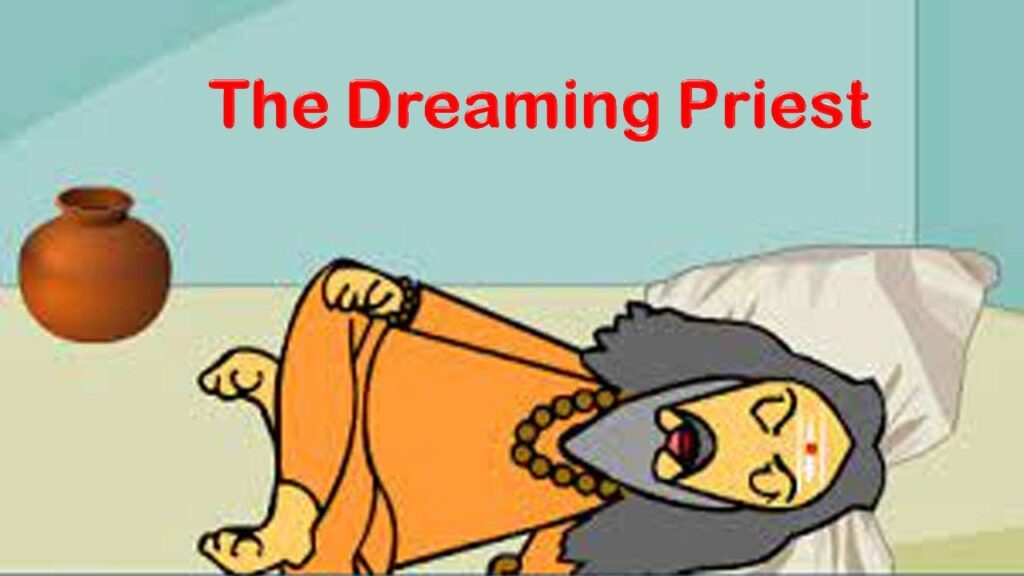
Long time ago there lived a priest who was extremely lazy and poor at the same time. He did not want to do any hard work but used to dream of being rich one day. He got his food by begging for alms. One morning he got a pot of milk as part of the alms. He was extremely delighted and went home with the pot of milk. He boiled the milk, drank some of it and put the remaining milk in a pot. He added slight curds in the pot for converting the milk to curd. He then lay down to sleep.
Soon he started imagining about the pot of curd while he lay asleep. He dreamed that if he could become rich somehow all his miseries would be gone. His thoughts turned to the pot of milk he had set to form curd. He dreamed on; “By morning the pot of milk would set, it would be converted to curd. I would churn the curd and make butter from it. I would heat the butter and make ghee out of it. I will then go to that market and sell that ghee, and make some money. With that money i will buy a hen. The hen will lay may eggs which will hatch and there will be many chicken. These chicken will in turn lay hundreds of eggs and I will soon have a poultry farm of my own.” He kept on imagining.
“I will sell all the hens of my poultry and buy some cows, and open a milk dairy. All the town people will buy milk from me. I will be very rich and soon I shall buy jewels. The king will buy all the jewels from me. I will be so rich that I will be able to marry an exceptionally beautiful girl from a rich family. Soon I will have a handsome son. If he does any mischief I will be very angry and to teach him a lesson, I will hit him with a big stick.”During this dream, he involuntarily picked up the stick next to his bed and thinking that he was beating his son, raised the stick and hit the pot. The pot of milk broke and he awoke from his day dream.
Moral: There is no substitute for hard work. Dreams cannot be fulfilled without hard work.


